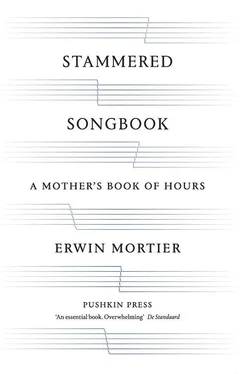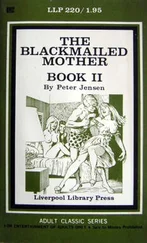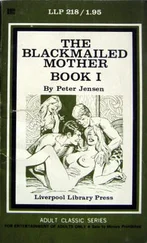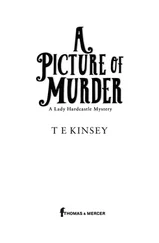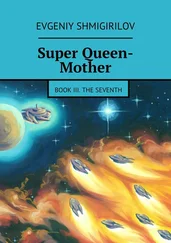She has lost her way in a labyrinth of drying sheets.
She is stuck in the mud and tries in vain to pull one leg loose.
She puts a lump of sugar in her mouth and her whole being, or what is left of it, sucks on it for all it is worth and everything in her relaxes, as if her organism remembers what sweetness is — as if her organism is relieved that it remembers sweetness.
She pulls on the hem of the undercloth on the table. She tries to lay the hem parallel to the edge of the table, again and again.
She cries and she laughs and she cries and she laughs, four or five times a minute.

My mother,
for a whole morning she searches for a word
as a cornerstone to fill the breach.
For a whole morning the bitten hole
of that word stands missing between us.
Mother’s word for today is erosion.
She stammers alluvially: the lilacs are still what’s
that called when they have no leaves — bare.
Whether there will be ice on the pond is uncertain this year,
whether it will be strong enough to—
her fingers skate.
She says days are wintry
and they are.

She also says: what are those clicks, no
Clocks, you know, in the grass,
On legs, they’re laying but that one isn’t.
He’s just crowing. So funny
those things there
in the grass with cats.
Is it so windy today,
or are those my thoughts?

Will a day come when no one
remembers the right mistakes, no one still
knows what speech impediment
exactly to feed?
Will anyone bore through your sandcastles
of semantics with
firebreaks and understanding?

Why, after each mouthful, does she always
wipe the rim of the cup dry with her thumb?
Why do simple sweet wrappers suddenly become
transparent mysteries?
Why do I see her testing with her lips, the tip
of her tongue the difficult corners
of words as if she is
standing on a narrow ledge with her back
against the wall — why doesn’t she dare
to look down, and does she say
that something’s dizzy there?

Back home our mother goes visibly downhill. My father cannot see the reality and is balancing on the edge of a depression (for which there must be pills, but what good are they?). It threatens to infect us all. Inwardly I sometimes have the feeling that I am slowly transforming into some dull, colourless metal, with very little resonance. Something like zinc or tin: as solid as it is grey.
She collapsed. Her muscle tone is weakening. She can scarcely move her fingers or toes any longer. Slowly she is curling into the foetal position. It may be connected with the cold, with this long winter. Perhaps it will soon improve.
My father clings to any sign that somewhere in that languishing organism the woman he knows still lives. Some while ago I met my brothers and sisters to open up and get drunk — but also to establish whether we all agreed that a point is coming at which we will have to decide to put an end to the suffering. It sounds businesslike, but when the moment comes it will nevertheless be a dreadful decision — or, who knows, who knows, a release.

We have decided against a thorough periodic examination. The GP will keep an eye on her condition and if there are complications she can always go to the hospital.
What is the point of shoving her under a scanner every three or four months?
Subjecting her to the horror of a spinal puncture to find out what we actually already know — that the substances that are making her ill are not going away, on the contrary — would simply be a token of sadism.
Nor will she be given any pills which supposedly slow the degeneration of her nervous system, because the pills don’t do that. They are magic balls, that’s all, like extensive swathes of medical jargon: magic formulae with an ancient etymology that hangs our mother out to dry between the pages of a textbook.
For us doctors are not healers but interpreters: what we know in ordinary words they translate into terms of Greek and Latin origin. Leave philology out of it. I like doctors who don’t know everything either and say that in so many words. They exist, but they’re becoming rare.
I don’t want her to fall into the hands of some white-coated type who double-checks everything against his protocol of statistically backed bullet points and has scarcely any ear or eye for the person she still is.
Look and listen, listen closely, says our GP. And talk, but that is difficult with your mum, of course.

Mum, I remember, one of the first winters where it was clear to everyone how ill you were, sitting here on the chair by the window, and it was cold outside, bitterly cold. You were sitting right next to the radiator, the faintly ticking radiator. If you’d been able to, you would have crawled inside it. You held your hands against the warm side, all your fingers spread wide, and shivered and shivered.
I don’t know if you remember — no, you can’t possibly remember, I forget how old I was, perhaps about ten. We went to visit Lea in Ghent. We were walking along the Lousbergskaai; you were carrying my younger brother on your arm and at a street corner your foot slipped off the edge of the kerb and you fell.
My brother finished up on the asphalt, bawling. I remember I picked him up. You crawled to your feet — grazed knees, torn tights. You swore and bit back your tears, and pulled the tails of your jacket straight, that rust-coloured check two-piece, over your fake crocodile leather shoes. I remember thinking, or rather it being whispered from my gut: mothers die too.
Why do we accept the mortality of our fathers more easily than that of our mothers? Because the tough thread of life is spun from mothers? I think of your fingers on that radiator: so fragile, almost translucent, like the newly opened fingers of a foetus, through which the first blood vessels meander their way.
You fell, two summers ago, during the very last walk we all went on together. The Ardennes, end of September: the earth a carpet of dry leaves and husks, the smell of dew and vegetable decay. Somewhere on the descent from a hill, down to the river, you fell and I saw you scramble up, like thirty years before. First you wiped your knees clean, bit back your tears, and swore virtually identically — except that you now said it was our fault. We said nothing.
You could no longer cut up your own food. We saw that for the first time. You picked up your knife and fork for a moment — it seemed to be a ritual between the two of you — and then put them down again, after which my father took over and cut the potatoes and the meat into little pieces.
Читать дальше
